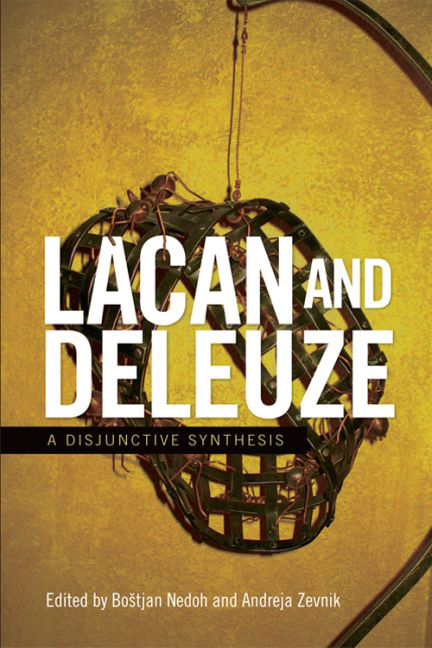Book contents
- Frontmatter
- Contents
- Acknowledgements
- Introduction: On a Disjunctive Synthesis between Lacan and Deleuze
- 1 For Another Lacan-Deleuze Encounter
- 2 Reciprocal Portrait of Jacques Lacan in Gilles Deleuze
- 3 Does the Body without Organs Have Any Sex at All? Lacan and Deleuze on Perversion and Sexual Difference
- 4 Gnomonology: Deleuze's Phobias and the Line of Flight between Speech and the Body
- 5 Lacan, Deleuze and the Politics of the Face
- 6 Denkwunderkeiten: On Deleuze, Schreber and Freud
- 7 Snark, Jabberwock, Poord'jeli: Deleuze and the Lacanian School on the Names-of-the-Father
- 8 Baroque Structuralism: Deleuze, Lacan and the Critique of Linguistics
- 9 Exalted Obscenity and the Lawyer of God: Lacan, Deleuze and the Baroque
- 10 The Death Drive
- 11 Repetition and Difference: Žižek, Deleuze and Lacanian Drives
- 12 Lacan, Deleuze and the Consequences of Formalism
- Notes on Contributors
- Index
11 - Repetition and Difference: Žižek, Deleuze and Lacanian Drives
Published online by Cambridge University Press: 20 April 2017
- Frontmatter
- Contents
- Acknowledgements
- Introduction: On a Disjunctive Synthesis between Lacan and Deleuze
- 1 For Another Lacan-Deleuze Encounter
- 2 Reciprocal Portrait of Jacques Lacan in Gilles Deleuze
- 3 Does the Body without Organs Have Any Sex at All? Lacan and Deleuze on Perversion and Sexual Difference
- 4 Gnomonology: Deleuze's Phobias and the Line of Flight between Speech and the Body
- 5 Lacan, Deleuze and the Politics of the Face
- 6 Denkwunderkeiten: On Deleuze, Schreber and Freud
- 7 Snark, Jabberwock, Poord'jeli: Deleuze and the Lacanian School on the Names-of-the-Father
- 8 Baroque Structuralism: Deleuze, Lacan and the Critique of Linguistics
- 9 Exalted Obscenity and the Lawyer of God: Lacan, Deleuze and the Baroque
- 10 The Death Drive
- 11 Repetition and Difference: Žižek, Deleuze and Lacanian Drives
- 12 Lacan, Deleuze and the Consequences of Formalism
- Notes on Contributors
- Index
Summary
Over the course of many years now, Slavoj Žižek repeatedly has emphasised that the fundamental underlying concern and main overriding ambition of his intellectual efforts in their entirety is to argue for a counterintuitive identity between, on the one hand, the Cogito-like subject of German idealism and, on the other hand, the death drive (Todestrieb) of Freudian and Lacanian psychoanalysis. Consistent with this emphasis, the short circuit of this coincidence of apparent antagonists (i.e. subject and death drive) also features centrally in the pages of Less Than Nothing: Hegel and the Shadow of Dialectical Materialism and Absolute Recoil: Towards a New Foundation of Dialectical Materialism. In these two philosophical works from 2012 and 2014 respectively, Žižek is concerned with confronting G. W. F. Hegel in particular with Sigmund Freud's and Jacques Lacan's theories of libidinal economics (as involving the death drive). Both the Todestrieb as well as a Lacanian distinction between drive (Trieb, pulsion) and desire (désir) are presented by Žižek as requiring of Hegel's philosophy certain revisions and changes while simultaneously being foreshadowed by this same philosophy.
In Less Than Nothing, Žižek goes so far as to put forward the death drive as the extimate nucleus of Hegelianism, as that which this philosophy, as it were, neither can live with nor can live without. In line with a stress on groundless contingency as the Ur-modality of Hegelianism's absoluteness, Žižek identifies as ‘the core of Hegelian dialectics’ (i.e. the main engine of Hegel's System) nothing other than ‘the death drive or the compulsion to repeat’ in its brute, dumb facticity – that is, a recurrent circling movement exhibiting an acephalous, idiotic character resembling a mechanical automaton rather than a human subject. Žižek's move here displays a convergence of (seeming) opposites in which the heights of meaning/sense (Hegel's dialectically systematic absolute Idea as the entire integrated network of categories and concepts both logical and real) coincide with the depths of meaninglessness/nonsense (a nondialectical repetitiveness making possible the Hegelian System and yet, at the same time, perpetually evading this System's comprehension).
- Type
- Chapter
- Information
- Lacan and DeleuzeA Disjunctive Synthesis, pp. 180 - 202Publisher: Edinburgh University PressPrint publication year: 2017



